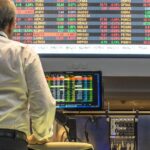In a noteworthy display of resilience, the stock market has shown remarkable strength despite concerns surrounding the U.S. government shutdown. On Thursday, the benchmark S&P 400 index surged by 8% in early morning trading, effectively extending its three-month winning streak. This bullish momentum was echoed across major indices, with both the NASDAQ and the Dow Jones Industrial Average also experiencing gains on the second day following the shutdown.
Market experts suggest that this muted reaction to the shutdown is not unexpected. Mark Gibbens, president and chief investment officer of Gibbens Capital Management, indicated that initial equity market reactions would likely be subdued, while the bond market might witness some downward adjustments in yields. Historically, prolonged government shutdowns have led to market declines, yet the shorter the shutdown, the less investors seem to worry.
Investors are well-versed in navigating the fluctuations caused by government funding lapses. The last significant shutdown lasted 35 days and incurred a $3 billion hit to GDP; thus, the duration of the current shutdown will be crucial in determining its impact. If it remains brief, market participants may continue to focus on opportunities rather than risks.
Should the shutdown lengthen, certain sectors could present investment opportunities. For instance, alternative investments like gold and cryptocurrencies may gain traction, as Gibbens predicts positive responses in those markets amid ongoing congressional debates over funding. Bonds stand to benefit as well, as treasuries are expected to see increased demand in a safety flight scenario, where investors seek refuge from stock market volatility.
Additionally, international diversification could come into play. Investors might redirect capital toward foreign stocks as U.S. fiscal uncertainties prevail, though such moves are typically short-lived. In contrast, a prolonged shutdown may bring downsides, particularly in areas such as initial public offerings (IPOs), where a temporary freeze is anticipated. However, experts remain optimistic that any disruption will merely postpone market recovery rather than derail it entirely.
In the defense sector, larger contractors like Lockheed Martin and Northrop Grumman may be less adversely affected due to long-term contracts, while smaller suppliers and those awaiting new funding could face delays and cash flow challenges. Travel-related stocks are also at risk, especially if the shutdown extends. The effects of unpaid air traffic controllers and TSA agents could lead to staffing challenges and increased flight delays.
For Main Street investors navigating this uncertain terrain, it’s prudent to exercise caution. Market history often shows resilience during such disruptions. While volatility can provide opportunities for portfolio rebalancing or upgrades in quality investments, analysts recommend maintaining liquidity for immediate needs and staying alert to any exposure to federal contracts.
Ultimately, while the government shutdown presents potential challenges, broader economic factors such as inflation, Federal Reserve policy, and global geopolitical dynamics remain key drivers for investment strategies moving forward.







